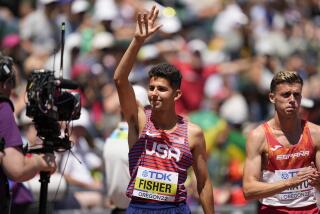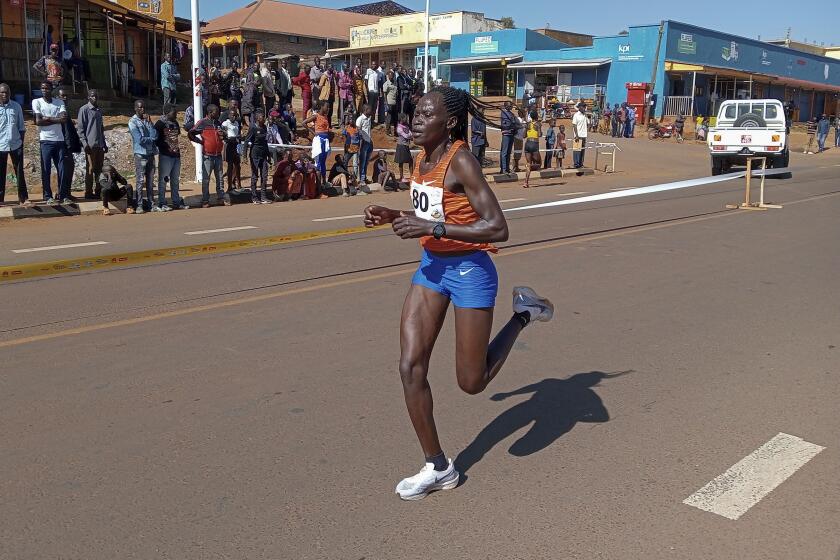When It Comes to Medals, Terrell’s In a Zone Alone : Canoeing: Newport Beach man will enter today’s U.S. Olympic Festival competition as the all-time leader with 23 medals.
NEWPORT BEACH — Nestled in a cove of Newport’s Back Bay, the nondescript single-story structure, painted the same color gray as the leaden early-morning sky, appears deserted. The sign above the door reads, “Newport Aquatic Center.”
There are a couple of cars in the parking lot and, around back, the building’s open bay doors reveal scores of canoes, kayaks and rowing shells, hung neatly in stacked rows.
Out on the bay emerges the silhouette of a man perched precariously on one knee in a tiny craft he sends gliding across the mirror-like surface with each powerful stroke of his paddle.
It is the perfect setting for Jim Terrell, an athlete who is used to toiling alone as he seeks to reach the pinnacle of an obscure sport.
There is little fame and no fortune in canoeing.
In this country, Terrell, a 26-year-old from Newport Beach, is about as close to a superstar canoeist as one can get. He will enter today’s U.S. Olympic Festival competition in Marina del Rey’s Ballona Creek as the all-time leader with 23 festival medals.
But he’s not out there stroking through the water each morning with visions of his face on a Wheaties box to serve as motivation. Forget endorsing breakfast, he’d be ecstatic if canoeing success would help him buy breakfast.
Ever since he was 14 years old and won the 500-meter and 1,000-meter singles events to make a U.S. junior team that would participate in the 1981 World Championships, Terrell has been determined to see just how good a paddler he can be.
So, in the 12 years since, he has forsaken an education and a career while pursuing his quest to be the best in a sport that requires a demanding combination of balance, strength and rhythm.
“It’s really one of the hardest sports to learn,” Terrell said. “It takes a long time just to master how to keep the canoe upright. And once you learn that, it takes another couple of years to learn how to steer.”
Terrell said he spends about 30 hours a week paddling, running, weightlifting and preparing for, or cleaning up after, workouts. He also serves as his own coach most of the time.
And, most important, he provides his own motivation.
“Jim takes his training very seriously and he’s out there every morning pushing himself,” said Paul Prioleau, the aquatic center’s director. “This isn’t a sport like football with all the input from coaches. You’re out there by yourself. When you pass someone in a race, the strength has to come from within. The desire to work hard in training every day has to come from the same source.”
In the case of Terrell, the well apparently runs deep.
He thought he was ready to peak for the 1988 Olympic Games, but he contracted mononucleosis before the Olympic Trials and just barely made the U.S. team. He recovered enough to finish fourth in his semifinal heat of the 500-meter singles event at Seoul, but only the top three make the finals.
Frustrated and disappointed, Terrell retired from the sport his father had introduced him to as a 7-year-old on rivers near their house in Cincinnati. He took his first full-time job, accepting a position as director of the Newport Aquatics Center’s junior paddling program.
In less than a year, however, the administrator became a competitor again.
“Training is kind of like an addiction,” Terrell said. “Sure, there are times when I wish I could work full time and have things, like my own house. But I think as long as you’re basically happy doing what you’re doing, you keep going.
“When I’m satisfied that I’ve done as well as I possibly can in international competition, then I’ll be ready to retire.”
In 1987, Terrell won a gold medal in the 500-meter singles and a silver in the doubles at the Pan American Games, but in the World Championships that year--this time in the water with the dominant Eastern European paddlers--he finished fourth in the semifinals, barely missing the finals.
“The Soviets, the Germans, Bulgarians, Romanians and Hungarians are always very strong,” Terrell said. “The sport is so much more popular over there that they have a huge pool of athletes to choose from.
“Winning a medal in the Olympics would be a very optimistic goal for me. I’d have to trim three or four seconds off my best time in the 500 to do it, but I sure want to go give it a shot.”
So Terrell hopes this week’s competition is another step toward Barcelona next summer. And he wouldn’t mind widening his lead in Olympic Festival medals over table tennis player Sean O’Neill, who has 20 and is also competing next week.
“I had no idea when they told me I had become the all-time leader last year,” said Terrell, who will be competing in his ninth Olympic Festival. “I figured some roller-skater would have won four a year every year. I didn’t even know anyone was counting.”
He should have said he didn’t know anyone else was counting. When officials informed him he was the all-time leader with 23 medals, Terrell told them to take another look at the records because he had really won 24.
“They checked it out and said I won one of them as a junior, back when they had an under-18 division, and that one didn’t count,” he said. “It’s pretty neat being the Festival medal leader, but I’d trade them all for an Olympic medal.”
More to Read
Go beyond the scoreboard
Get the latest on L.A.'s teams in the daily Sports Report newsletter.
You may occasionally receive promotional content from the Los Angeles Times.







